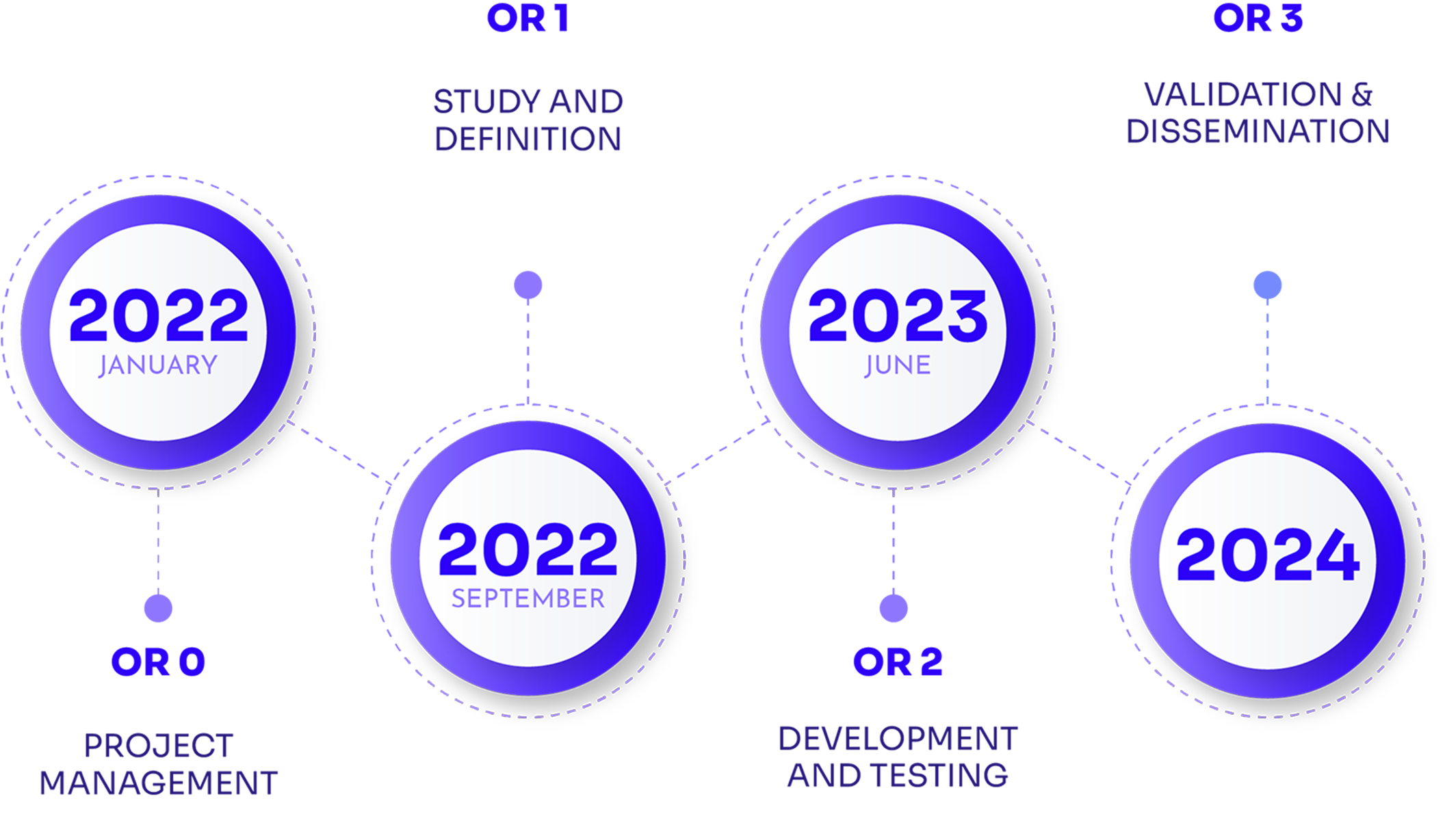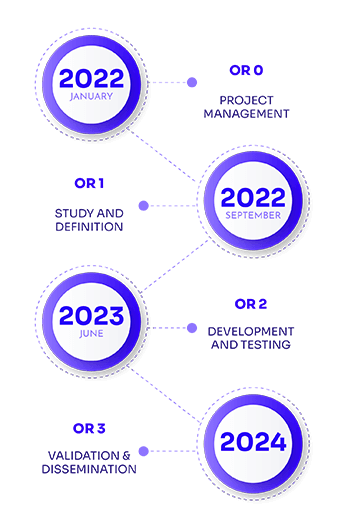Scaletech
Platform adaptable to any scientific and non-scientific domain, for the development of algorithms and computational calculation.
Research project objective
Scaletech solves the problem of moving from development to production of algorithms, which is common in the scientific community.
The platform uses Artificial Intelligence models to select resources to optimize efficiency and costs.

Details
Type
Industrial Research and
Experimental Development
WP Leader
Laser Romae s.r.l.
Project duration
18 months
OR0 - PROJECT MANAGEMENT
It involves the management and monitoring of all aspects of the Project, according to principles of coherence and efficiency, ensuring effective communication between the subjects involved, optimization of costs and activities, and the control/management of possible problems.
Implementation Activities
1. PROJECT MANAGEMENT FOR INDUSTRIAL RESEARCH ACTIVITIES
In this context, the Project Manager coordinates all phases of the project, from planning to implementation, constantly monitoring resources, times and budgets.
2. PROJECT MANAGEMENT FOR EXPERIMENTAL DEVELOPMENT ACTIVITIES
Experimental Development with focus on achieving a TRL (Technology Readiness Level) of 8 for software deliverables. During the project, the level of technological maturity will be periodically verified and the necessary actions will be taken to achieve this objective by the end of the project.
Achievement goal 0
PROJECT MANAGEMENT
It involves the management and monitoring of all aspects of the Project, according to principles of coherence and efficiency, ensuring effective communication between the subjects involved, optimization of costs and activities, and the control/management of possible problems.
Implementation activities
1. PROJECT MANAGEMENT FOR INDUSTRIAL RESEARCH ACTIVITIES
In this context, the Project Manager coordinates all phases of the project, from planning to implementation, constantly monitoring resources, times and budgets.
2. PROJECT MANAGEMENT FOR EXPERIMENTAL DEVELOPMENT ACTIVITIES
Experimental Development with focus on achieving a TRL (Technology Readiness Level) of 8 for software deliverables. During the project, the level of technological maturity will be periodically verified and the necessary actions will be taken to achieve this objective by the end of the project.
OR1 - STUDY AND DEFINITION
The platform will execute the algorithms, unifying the computational environment and, being API-based, can easily integrate with other systems to enrich the results. The goal is to create a consistent environment for developing and composing Sandboxes into workflows (DAGs), which can be executed at intervals or in response to events.
Implementation Activities
1. STUDY OF THE REFERENCE CONTEXT
The study will start from the analysis of the technologies and solutions currently available on the market.
2. STUDY OF INNOVATIVE APPROACHES
Innovative Artificial Intelligence approaches will be studied to predict the workload in computing systems, even with limited data. The system will use neural networks to handle complex workloads and will explore the use of multiple forecasting systems to improve forecasts.
3. DEFINITION OF SPECIFICATIONS
The specifications of the Scaletech platform will be defined, which, thanks to its modular nature, will support heterogeneous resources (private, public Clouds) and different types of clustering (e.g. Kubernetes, PBS). The platform will ensure the separation of algorithms and data within each working group.
Achievement objective 1
The platform will execute the algorithms, unifying the computational environment and, being API-based, can easily integrate with other systems to enrich the results. The goal is to create a consistent environment for developing and composing Sandboxes into workflows (DAGs), which can be executed at intervals or in response to events.
Implementation activities
1. STUDY OF THE REFERENCE CONTEXT
The study will start from the analysis of the technologies and solutions currently available on the market.
2. STUDY OF INNOVATIVE APPROACHES
Innovative Artificial Intelligence approaches will be studied to predict the workload in computing systems, even with limited data. The system will use neural networks to handle complex workloads and will explore the use of multiple forecasting systems to improve forecasts.
3. DEFINITION OF SPECIFICATIONS
The specifications of the Scaletech platform will be defined, which, thanks to its modular nature, will support heterogeneous resources (private, public Clouds) and different types of clustering (e.g. Kubernetes, PBS). The platform will ensure the separation of algorithms and data within each working group.
OR2 - DEVELOPMENT AND TESTING
The SCALETECH platform will be developed and tested, overcoming limitations such as the high cost and complex management of the computing nodes. With a simple interface, it will be possible to define parameters such as costs, times and priorities. The system, supported by the AI Orchestrator, will optimize the scheduling of computation on CM Managers, improving resource efficiency based on functional and administrative requirements.
Implementation activities
1. Development of an innovative AI algorithm
An Artificial Intelligence algorithm will be developed to optimize the use of resources, integrated into the "AI Model" module. Managed by the AI Orchestrator, it will select the best algorithm for each request. The system will include Deep Learning with LSTM networks to predict and simulate the workload, improving resource management.
2. Testing, debugging e fixing of innovative algorithm
We will proceed to carry out the testing, debugging and fixing phases of the innovative Artificial Intelligence algorithms developed and to create the algorithm in its final version.
3. PLATFORM DEVELOPMENT
The components of the SCALETECH platform will be developed and integrated, including the "Users" module for managing user roles, the "Workflow Manager" for scheduling sessions and the "Cluster Layer" for processing and storing results and sandbox.
4. Testing, debugging e fixing of innovative algorithm
We will start with the testing, debugging and fixing of the individual components of the SCALETECH platform, and then proceed with the complete testing of the integrated platform, defining use cases with the stakeholders involved from the beginning of the project.
Implementation activities
1. Development of an innovative AI algorithm
An Artificial Intelligence algorithm will be developed to optimize the use of resources, integrated into the "AI Model" module. Managed by the AI Orchestrator, it will select the best algorithm for each request. The system will include Deep Learning with LSTM networks to predict and simulate the workload, improving resource management.
2. Testing, debugging and fixing of the innovative AI algorithm
We will proceed to carry out the testing, debugging and fixing phases of the innovative Artificial Intelligence algorithms developed and to create the algorithm in its final version.
3. PLATFORM DEVELOPMENT
The components of the SCALETECH platform will be developed and integrated, including the "Users" module to manage user roles, the "Workflow Manager" to schedule sessions and the "Cluster Layer" for processing and storing results and sandbox.
4. Testing, debugging and fixing of the innovativ AI agorithm
We will start with the testing, debugging and fixing of the individual components of the SCALETECH platform, and then proceed with the complete testing of the integrated platform, defining use cases with the stakeholders involved from the beginning of the project.
OR3 - VALIDATION & DISSEMINATION
The results of the research activities will be disseminated through the creation of the "VALORIZATION AND DIFFUSION PLAN".
Implementation Activities
1. DISCLOSURE OF PROJECT SPECIFICATIONS AND EXPECTED RESULTS
Information material will be produced aimed at explaining the objectives of the Research and Development Project.
2. VALORIZATION AND DISSEMINATION OF RESULTS
The results will be disseminated through the drafting of a paper concerning first the study and definition phases and then the development and testing of the system.
3. DISSEMINATION OF THE PROJECT RESULTS
The results obtained at the end of the Project will be made public through a Conference. Furthermore, information material will be drafted.
Achievement objective 3
VALIDATION & DISSEMINATION
The results of the research activities will be disseminated through the creation of the "VALORIZATION AND DIFFUSION PLAN".
Attività realizzative
3.1. DIVULGAZIONE DELLE SPECIFICHE DI PROGETTO E DEI RISULTATI ATTESI
Sarà prodotto il materiale divulgativo finalizzato ad esplicitare gli obiettivi del Progetto di Ricerca e Sviluppo.
3.2. VALORIZZAZIONE E DIFFUSIONE DEI RISULTATI
Saranno diffusi i risultati attraverso la stesura di un paper riguardante dapprima le fasi di studio e definizione e poi le sviluppo e test del sistema.
3.3. DIVULGAZIONE DEI RISULTATI DEL PROGETTO.
I risultati ottenuti al termine del Progetto, saranno resi pubblici attraverso una Conferenza. Inoltre, si procederà alla stesura del materiale divulgativo.
Timeline


